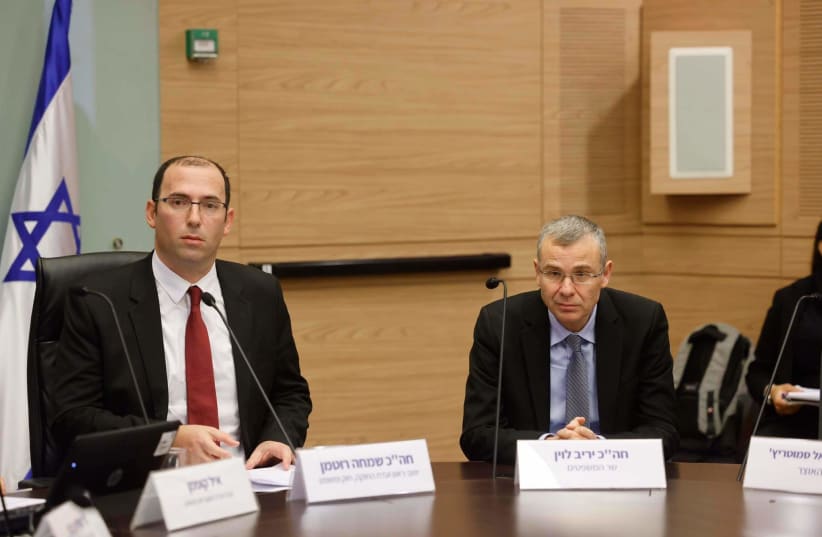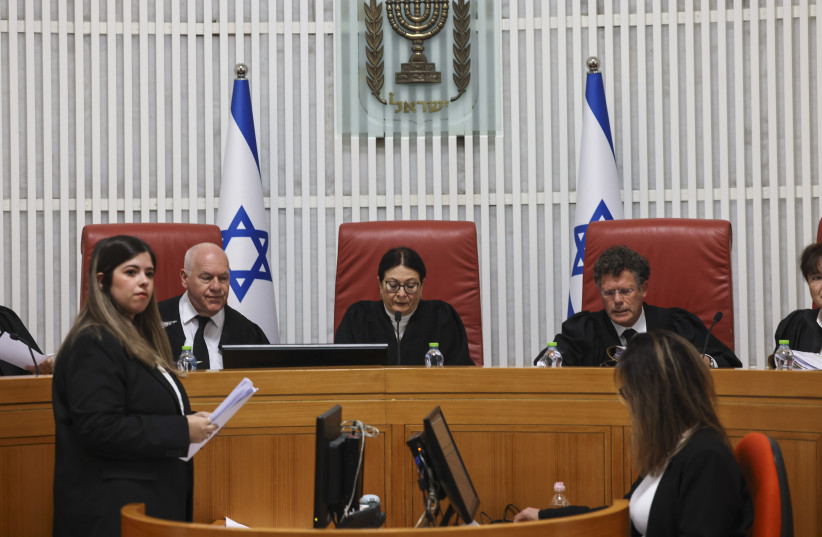A dramatic and controversial legal revolution that would drastically change the way that the High Court of Justice would function, and shift the balance of power between the Knesset and other government bodies.
For those preoccupied with the recent debate about the judicial reforms announced by Justice Minister Yariv Levin last Wednesday, it could be assumed the topic being described is that controversial plan. However, the same sentence could apply to the constitutional revolution that took place in Israel in the 1990s at the hands of then Supreme Court chief justice Aharon Barak.
It is easy to forget that Israel is a young country and has gone through a spate of rapid changes in its systems over the decades. Yet these two legal upheavals are connected by more than just the way they have altered the course of the country.
Proponents of the judicial reform have drawn a comparison between the constitutional revolution and the Levin plan, framing the latter as a counterrevolution to turn back the clock.
The Jerusalem Post spoke to three veteran observers of the legal system to explore whether the Levin plan could be reasonably viewed as a counter-constitutional revolution – or an anti-constitutional revolution.
The constitutional revolution
In 1992, the Knesset passed Basic Law: Human Dignity and Liberty and Basic Law: Freedom of Occupation. The Basic Laws have always had a quasi-constitutional quality, but what set these two laws apart was that they did not allow for further legislation that contradicted them. This distinction put the Basic Laws in a realm of constitutional supremacy above other types of legislation, and in 1995 the High Court used this as the basis for enshrining their powers of judicial review to strike down legislation that was judged as contravening the Basic Laws.
“This is why it is called the revolution,” said constitutional law expert Prof. Barak Medina. “It was the idea that the court is empowered to employ judicial review over legislation of the Knesset, not only over decisions of government, but also legislation.”
Both revolutions, have come from the Knesset, noted Dr. Amir Fuchs, a senior researcher at the Israel Democracy Institute. However from there, Medina said, a difference can be seen in the constitutional revolution and the proposed reforms in the speed in which the changes occurred.
“From a procedural point of view, the reform in the ’90s was the result of very extensive and extended discussions among all members of Knesset. It took more than two years to reach an agreement,” he said.
Fuchs said that the first drafts didn’t just take a while to crystallize into the Basic Laws; there were supporters for the legislation across the aisle.
Medina said that “there were substantial concessions on both sides that resulted in an overwhelming majority supporting them,” and while at present some argue that not many Knesset members voted on the final bill, it was only because it was clear that there was enough support to pass the legislation that all the parties had already agreed on.
In contrast, Medina and Fuchs note that the Levin proposal has proceeded with far greater hastiness and little to no compromise.
“Nowadays we are talking about a very rushed and quick procedure and, most importantly, disregarding the opposition, just relying on support of the coalition in order to enact these changes,” said Medina.
“What we are seeing these days is a one-sided maneuver,” said Fuchs. “It is not done with the consensus, but just from one side that captured the majority.”
Reviewing judicial review
Critics of the constitutional revolution argue that consensus or not, the Knesset members’ debates show that they were ignorant of what the new Basic Laws would allow, and the High Court engaged in abusive judicial activism in its seizing of the power of judicial review.
Fuchs dismisses the idea that the Knesset made a mistake. While he said that it was possible that some members perhaps didn’t understand what they were voting for, he said that transcripts show that many did, and “if what the Supreme Court interpreted in the years just after was so surprising, they could have just abolished those Basic Laws and they didn’t, because it was not really surprising.”
Medina said that the High Court’s interpretation of what the Basic Laws meant was “just declaring explicitly what was in fact the law” and “just made explicit something that was inherent in any liberal democracy and in the jurisprudence of the court.”
“I think the mainstream point of view of Israeli legal scholars, this was the obvious interpretation. And you can see that this is what most of the legislature meant,” said Fuchs.
The Levin plan has sought to limit judicial review. A proposed override clause would allow a simple majority in the Knesset to overturn the striking of legislation by the court. Judicial review itself would often require an extended bench and a special majority to be successful. These items in the plan were discussed during the 2022 general election campaign, as a means of limiting what proponents of the plan say is a court tendency to activist interference in government operations.
Yaniv Roznai, codirector of the Rubinstein Center for Constitutional Challenges at Reichman University, rejected the idea outright that the court has abused its power in this manner.
“The court does not disturb governance. It hardly intervenes in legislation. It invalidated 22 provisions of laws, not even full laws, in the last 30 years,” said Roznai.
Medina also said that “one may suggest that the High Court, at least in recent years, in the last five or even 10 years, was very strained, very restrained. It expressed deference toward the government in many aspects.”
Critics say that the court has lost public trust because of its activism and rulings in contradiction to the majority will. Fuchs said that while trust in the institution has gone down, it is still higher than the trust in politicians. Roznai also noted that public trust in the judicial system is still higher on average compared to most Western democracies.
Israel is not alone in the decrease of public trust in institutions, and is part of what has been described as a global antidemocratic trend – just as a democratic trend brought about the constitutional revolution in the first place.
Democratic and antidemocratic trends
In the ’90s, said Fuchs, “we were part of a trend of giving human rights more power and more protection of constitution.”
Roznai explained how the periods of time differed. The ’90s saw the collapse of the Soviet Union, and there was a sense of democratic revival with “new democratic countries all around the world with modern liberal constitutions, with rule of law principles and elaborated bills of rights and constitutional courts.”
“What we now see in the world is the opposite trend,” said Roznai. “The last 16 years we’ve been witnessing a crisis of democracies around the world. There is a process of democratic erosion by which elected governments erode the democratic order and institutions through legal means. We’ve seen liberal democracies collapsing, and we’ve seen the inclusion of even antidemocratic and authoritarian elements in places such as Hungary and Poland and Turkey.”
Fuchs said that “the whole legal or academic community has been talking about this trend for almost 10 years. Some call it populism, some call it illiberal democracies, and we hope we won’t be there.”Roznai said that 2022 had been the worst year in terms of democracy.
Some supporters of the Levin plan have characterized the reform as merely reversing elements of the constitutional revolution. However, critics argue that it is not a reversal but a new direction altogether.
We have to go back?
Medina, Roznai and Fuchs all agreed that the reforms would not restore Israel to a prior state, but would bring it to a state it had not been in before.
“There will be no real protection of human rights and basic rights in Israel after the nowadays revolution,” said Fuchs. “What happened in 1992, we have to understand, wasn’t dramatic in that it didn’t change the way the courts work, it didn’t change the way the attorney-general works, it didn’t change the way the legal advisers work. It was an evolution, kind of a progressive evolution of human rights that were strengthened to become constitutional rights.
“This counterrevolution is not turning us back to 1992 to what we had before 1992. Not at all. We are going to a place where we have never been. We never had a Supreme Court that was appointed by politicians. We never had it from day one when the country was established. We never had legal advisers who are subject to the ministers. This is a change of the regime in a way that the majority will have full power, total power, absolute power. We never had it from the beginning, from the establishment of the country.”
Roznai also argued that Israel was not such a great democracy in the past, and that the country had made great strides. In the past Israel practically had one-party rule, at times military governance, and even stronger censorship.
The fear of reversion, or of reaching a state of illiberalism different from what Israel experienced in its early youth, has led protesters to decry the “death of democracy.”
Fuchs said that “it’s not the death of democracy, it’s not the end of democracy, but it will be very hard on democracy.”
What would be removed from Israel’s liberal democracy would be checks and balances and protections for human rights. The Israeli system has few checks and balances, such as a strong constitution like the US, or a bicameral parliament and commitment to regional human rights bills like the UK. He said that Israel would be a hollow democracy.
Medina described the problem not being an immediate death of democracy, but that the proposal was a disaster that would create serious risks in the future.
“There are two stages here,” said Medina. “The first stage that we are discussing now has to do with gatekeepers. The ability to restrain the government will not exist.” In the second stage, an authority could take advantage of the system.
However, Roznai said that he doesn’t think that it is an exaggeration to call it the death of democracy, if the reforms pass. He dismissed arguments that some have been bemoaning the death of democracy for decades.
“Sometimes, when you cry wolf, eventually the wolf arrives,” said Roznai. “My biggest fear is that even each of these reforms, this proposed reform, is bad on its own. But if all of them will be enacted, this basically means one thing – that the government will have a blank check to do whatever it wants. I don’t think this is a very good sign for the future of liberal democracy in Israel.”
Another revolution?
Fuchs agreed that the reforms and the constitutional revolution represented dramatic changes for Israel.“People say that this is a counterrevolution,” he said. “In a way, I think they are right.”
Roznai characterized the reform not as a counterrevolution but in contrast to the constitutional revolution as “an unconstitutional or anti-constitutional revolution.
“Both reforms are revolutionary in the sense that both of them brought and will bring a paradigm shift in how constitutionalism is experienced in Israel.

